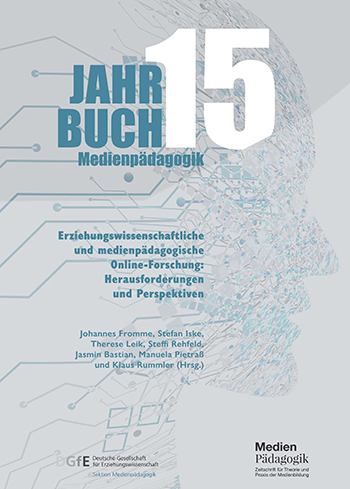Abstract
Based on the fact that the digital media are constitutive for social and cultural spaces, the contribution establishes two theses on educational online research. On the one hand, the importance of online ethnographic research in the horizon of digital mediality is discussed, which, as a methodology, enables a view of the formal structures of digital media and their cultural and social frameworks. On the other hand, the handling of digital data requires a methodological and methodological reflexivity with regard to their structural embedding and nature. This thesis specifically adresses the question of how to deal with technological infrastructures, and how to think about not only data, but also digital methods for educational science. Both theses are interrelated, where the point is to make the entanglements visible and to plead for a reflexive use of digital data, methods and methodologies.
References
Berry, David M. 2011. The Philosophy of Software: Code and Mediation in the Digital Age. Basingstoke: Palgrave MacMillan.
Berry, David M., Hrsg. 2012. Understanding Digital Humanities. Houndmills, Basingstoke, Hampshire ; New York: Palgrave Macmillan. https://doi.org/10.1057/9780230371934.
Brügger, Niels. 2011. «Web Archiving – Between Past, Present, and Future». In The Handbook of Internet Studies, herausgegeben von Mia Consalvo und Charles Ess, 24–42. Malden: Wiley-Blackwell.
Chun, Wendy H. K., Anna W. Fisher, und Thomas Keenan, Hrsg. 2015. New Media, Old Media: A History and Theory Reader. 2. Aufl. New York, London: Routledge.
Consalvo, Mia. 2009. Cheating: Gaining Advantage in Video Games. First MIT Press paperback edition. Cambridge, Mass: Massachusetts Institute of Technology.
Consalvo, Mia, und Charles Ess, Hrsg. 2011. The Handbook of Internet Studies (Handbooks in communication and media). Malden: Wiley-Blackwell.
Crawford, Kate. 2015. «Can an Algorithm Be Agonistic? Ten Scenes from Life in Calculated Publics». Science, Technology, & Human Values 41 (1): 77–92.
Culkin, John M. 1967. «A Schoolman’s Guide to Marshall McLuhan». Saturday Review 50 (11): 51–53.
Dander, Valentin. 2014. «Von der ‹Macht der Daten› zur ‹Gemachtheit von Daten›. Praktische Datenkritik als Gegenstand der Medienpädagogik.» Mediale Kontrolle unter Beobachtung, (3). http://www.medialekontrolle.de/wp-content/uploads/2014/09/Dander-Valentin-2014-03-01.pdf.
Dutton, William H. 2014. The Oxford Handbook of Internet Studies. Oxford: Oxford Univ. Press.
Holze, Jens. 2017. «Digitales Wissen: bildungsrelevante Relationen zwischen Strukturen digitaler Medien und Konzepten von Wissen». Dissertation zur Erlangung des Dr. phil., Magdeburg: Otto-von-Guericke-Universität Magdeburg.
Jörissen, Benjamin. 2014. «Digitale Medialität». In Handbuch Pädagogische Anthropologie, herausgegeben von Christoph Wulf und Jörg Zirfas, 503–13. Wiesbaden: Springer Fachmedien. https://doi.org/10.1007/978-3-531-18970-3_46.
Jörissen, Benjamin. 2016. «‹Digitale Bildung› und die Genealogie digitaler Kultur: historiographische Skizzen». MedienPädagogik: Zeitschrift für Theorie und Praxis der Medienbildung 25: 26–40. https://doi.org/10.21240/mpaed/25/2016.10.26.X.
Jörissen, Benjamin, und Winfried Marotzki. 2009. Medienbildung - eine Einführung: Theorie - Methoden - Analysen. Bad Heilbrunn: UTB.
Jörissen, Benjamin, und Dan Verständig. 2016. «Code, Software und Subjekt». In Das umkämpfte Netz: Macht- und medienbildungstheoretische Analysen zum Digitalen, herausgegeben von Ralf Biermann und Dan Verständig, 37–50. Wiesbaden: Springer Fachmedien.
Kozinets, Robert V. 2006. «Netnography». In The Sage Dictionary of Social Research Methods, herausgegeben von Victor Jupp, 193–95. London: Sage.
Kozinets, Robert V. 2010. Netnography: Doing ethnographic research online. London: Sage.
Lessig, Lawrence. 2010. Code: Version 2.0. New York: SoHo Books.
Logan, Robert K. 2013. McLuhan Misunderstood: Setting the Record Straight. Toronto: Key Publishing House Incorporated. [Kindle Edition].
Marotzki, Winfried. 2003. «Online-Ethnographie – Wege und Ergebnisse zur Forschung im Kulturraum Internet». In Jahrbuch Medienpädagogik 3, herausgegeben von Ben Bachmair, Peter Diepold, und Claudia De Witt. Leverkusen: Leske + Budrich.
Marotzki, Winfried. 2008. «Internet Communities». In Grundbegriffe Ganztagsbildung: Das Handbuch, herausgegeben von Thomas Coelen und Hans-Uwe Otto, 402–10. Wiesbaden: VS Verlag für Sozialwissenschaften. https://doi.org/10.1007/978-3-531-91161-8_40.
McLuhan, Marshall. 1969. Counterblast. Toronto: McClelland and Stewart.
McLuhan, Marshall. 1992. Die magischen Kanäle. Understanding Media. Düsseldorf: Econ.
McLuhan, Marshall, und Quentin Fiore. 1967. Medium Is the Massage: An inventory of effects. 1. Aufl. London: Penguin Books.
McLuhan, Marshall, und Eric McLuhan. 1988. Laws of Media. Toronto: University of Toronto Press.
Rieder, Bernhard. 2013. «Studying Facebook via data extraction: the Netvizz application». In WebSci ’13 Proceedings of the 5th Annual ACM Web Science Conference, 346–55. New York: ACM.
Seaver, Nick. 2017. «Algorithms as culture: Some tactics for the ethnography of algorithmic systems». Big Data & Society 4 (2): 2053951717738104. https://doi.org/10.1177/2053951717738104.
Stalder, Felix. 2016. Kultur der Digitalität. Frankfurt am Main: Suhrkamp.
Thiedeke, Udo. 2007. «Trust, but test!: das Vertrauen in virtuellen Gemeinschaften». Zugl.: Mainz, Univ., Habil.-Schr., Konstanz: UVK Verlagsgesellschaft. http://deposit.d-nb.de/cgi-bin/dokserv?id=2901059&prov=M&dok_var=1&dok_ext=htm.
Verständig, Dan. 2017. «Bildung und Öffentlichkeit – Eine strukturtheoretische Perspektive auf Bildung im Horizont digitaler Medialität». Dissertation, Magdeburg. http://nbn-resolving.de/urn:nbn:de:gbv:ma9:1-10090.
Verständig, Dan, und Jens Holze. 2016. «It’s not just a game – Subversive Praktiken in digitalen Spielkulturen». In Phänomen Let´s Play-Video: Entstehung, Ästhetik, Aneignung und Faszination aufgezeichneten Computerspielhandelns, herausgegeben von Judith Ackermann, 225–39. Wiesbaden: Springer Fachmedien. https://doi.org/10.1007/978-3-658-12936-1_16.
Welker, Martin. 2014. «Normalisierung und Ausdifferenzierung von Online-Forschung – Eine Einführung». In Handbuch Online-Forschung: Sozialwissenschaftliche Datengewinnung und -auswertung in digitalen Netzen, herausgegeben von Martin Welker, Monika Taddicken, Jan-Hinrik Schmidt, und Nikolaus Jackob, 14–41. Köln: Herbert von Halem Verlag.
Wellman, Barry. 2004. «The Three Ages of Internet Studies: Ten, Five and Zero Years Ago». New media & society 6 (1). http://homes.chass.utoronto.ca/~tkennedy/Courses/2P26/Wellman%202004.pdf.

